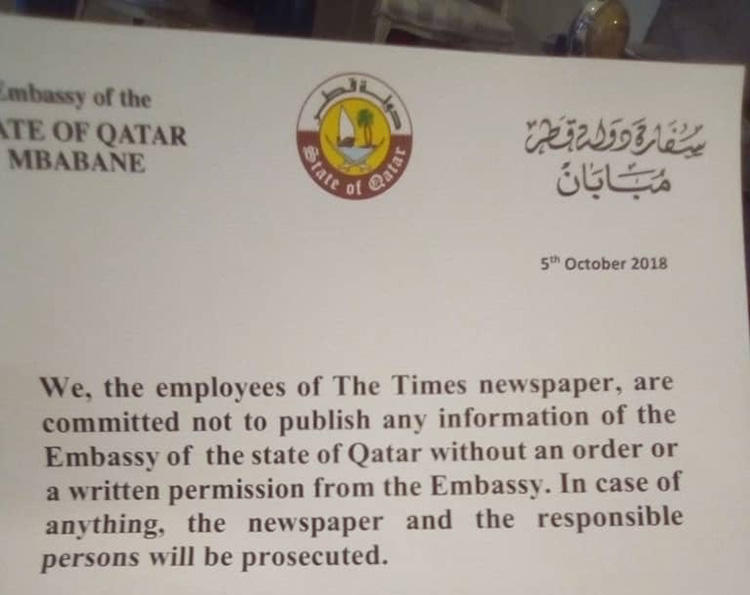Security staff detained two Times of Swaziland journalists for more than an hour at the Qatar Embassy in Swaziland’s capital, Mbabane, on October 5, 2018, according to a statement by the local chapter of the Media Institute of Southern Africa (MISA). The journalists were detained after a senior diplomat tried to make them sign a statement barring them from publishing a report about his alleged involvement in an assault, according to The Times of Swaziland.
The paper’s business editor Kwanele Dhladhla and investigative journalist Welcome Dlamini were at the embassy to interview Qatar’s Charge d’ Affaires and acting ambassador Yaqoub Yousuf al-Mulla about an incident in which the diplomat allegedly pointed a firearm at a street vendor, according to The Times of Swaziland Sunday and a Swazi journalist with knowledge of the case, who spoke with CPJ but asked not to be named for fear of reprisal.
Al-Mulla agreed to speak to the journalists, but then tried to force Dhladhla and Dlamini to sign a written acknowledgement they would not publish the article, according to a Times of Swaziland report.
A document on an Embassy of Qatar letterhead, dated October 5 and published by the Times of Swaziland, stated, “We, the employees of The Times newspaper, are committed not to publish any information of the embassy of the state of Qatar without an order or written permission from the embassy. In case of anything, the newspaper and the responsible persons will be prosecuted.”
Dhladhla and Dlamini refused to sign, saying the story was in the public interest, according to the Zimbabwe chapter of MISA, who also issued a statement, and the Times of Swaziland. The pair recorded the interview, according to the journalist with whom CPJ spoke.
According to MISA-Zimbabwe, the diplomat ordered embassy security staff to detain the journalists until they signed the agreement. The diplomat allegedly threatened to report the journalists to senior member of the Swazi Royal House, according to MISA and the Times of Swaziland article.
Al-Mulla called the Swazi police and reported that the journalists had broken into the embassy because they did not have an appointment or permission to be there, MISA-Zimbabwe said.
After Dhladhla and Dlamini were released, they went to the police and laid a charge of kidnapping against the diplomat, according to MISA-Zimbabwe. Neither journalist signed the document, according to the journalist with whom CPJ spoke.
The Times of Swaziland article about the incident, published on October 6, 2018, quoted Assistant Chief Police Information and Communications Officer Inspector Nosipho Mnguni as saying that “an enquiry pertaining to trespassing was being pursued against the journalists”
Swazi police spokeswoman Phindile Vilakati referred CPJ to Swaziland’s Ministry of Foreign Affairs for comment. As of October 24, 2018, Joel Nhleko, the ministry’s principal secretary, had not responded to CPJ’s WhatsApp messages seeking comment.
The paper published the article about al-Mulla’s alleged assault of a street vendor on October 7, 2018. The report said that the diplomat admitted having a gun but disputed allegations that he threatened the vendor.
Times of Swaziland editor Martin Dlamini told CPJ, “We are shocked that our journalists could be subjected to such treatment by an ambassador. This is not just a serious attack on the local media but displays disrespect toward the country. We will follow this matter until justice is served.”
A senior official in the Qatari Ministry of Foreign Affairs told CPJ in an emailed statement that al-Mulla had agreed to an off-the-record briefing on October 5, but that Dlamini and Dhladhla had “misunderstood the agreed ground rules as the Acting Ambassador was surprised to find that he had been recorded throughout”, the official said. The official denied that the journalists were held against their will and said that if any evidence of a violation from a Qatari diplomat toward a journalist is found, “the necessary steps will be taken.”
